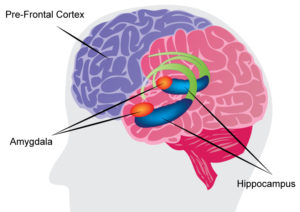“What nourishes the human spirit, the whole spirit, also hones our minds” ~ Adele Diamond
Last week I attended “Adele Diamond: Nourishing the Body, Spirit and Mind” presented by the Dalai Lama Center. This UBC brain researcher’s presentation focused on the development of the Executive Functions in the Prefrontal Cortex.
What are Executive Functions?
The 3 Core Functions:
1) Working Memory – the ability to hold information in your mind while taking in additional information
2) Cognitive Flexibility – the ability to take the perspective of others and “think outside the box”
3) Inhibitory Control – attentional control, self-control
The Higher Order Executive Functions:
i) reasoning ii) problem solving iii) planning
According to Adele Diamond, Executive Functions are the core skills critical for positive cognitive, social and psychological growth. Executive Function Skills are more important for school readiness than IQ. They are also the first to suffer when you’re out of alignment. Eg. When you’re lonely, sad, sleep deprived, physically unfit etc. Even mild stress increases the release of Dopamine in the Prefrontal Cortex (the centre for the Executive Functions). Therefore, the more positive our mood, the greater one’s creativity and accessibility to the executive functions.
How to Encourage the Development of Executive Functions?
1) RELAX – stress is detrimental to one’s parenting abilities and children will pick up on their parents’ stress.
“Children live in the unconscious of their parents” ~ C.G. Jung
Children need “down-time”. They need time to consolidate all of the information and skills which they are learning. Most children are over-scheduled.
2) LISTEN – this the most basic and powerful way to communicate. When a child is speaking, just listen, don’t go into problem-solving mode. Love is the giving of your time and truly listening. By listening, parents can make a connection to the emotional state of their child. When children know they are valued, they feel valuable. Try not to correct a child, but if you need to, start with the positive feedback first.
3) PLAY – social pretend play is very beneficial for the development of executive functions. In this type of play, one uses working memory, inhibitory control and cognitive flexibility. (Tools of the Mind – excellent research-based program for helping pre-schoolers develop executive functions.)
4) JOY – involve children’s imagination and passions. Have faith in your child. Give attention to all parts of your child: social, spiritual, emotional and physical. Each part develops best when not one is neglected. EnCOURAGE – let your child take a chance. Tap into your child’s natural intrinsic motivation. Expose your children to sports, music, the arts. Believe in your child.
5) COMPASSION – have children practice compassion every day. Encourage them to participate in acts of kindness every day. Model random acts of kindness. To learn something we new, we need the Prefrontal Cortex. The only way something becomes automatic is through repeated, meaningful action.
Adele Diamond also quoted different research studies which have all shown that participants perform at the level of which you tell them they are capable. If you tell a group that they have been specially selected because they are bright, they will perform well. If you tell a group that they will find a task difficult, sure enough, they will find it difficult.
“Treat people as if they were what they ought to be and you help them become what they are capable of being.“
~ Johann W. Van Goethe
Other important points from Adele Diamond:
- It’s important to scaffold children. Find ways to support them to give them successes
- Story-telling, without pictures, is another way of developing the working memory as one has to hold the information in ones’ mind while listening to the story
- Bilingualism aids in the development of executive functions as one exercises the brain by switching back and forth between languages, retrieving the right word in the right language, and inhibiting use of one language while using the other language
- Adults can increase their executive functions by practicing Mindfulness, meditation, ballroom dancing (75% less chance of dementia for ballroom dancers), continuing to learn another language
- Remember the Prefrontal Cortex (the home of the executive functions) isn’t fully mature until the mid-20’s – it is still immature through the teen years
- Instead of punishing a child, offer closed choices, teach them alternate ways of doing things. When seeing “misbehaviour” as coming from hurt, one then can look it differently. Punishment creates resentment, kids focus more on the punishment than on the “lesson”. Dog training schools don’t believe in punishment so why would we…
- The brain is plastic – it never stops growing. Exercise the areas that you want to make more robust
“Anyone who’s never made a mistake, has never tried anything new” ~ Albert Einstein
Want to Connect?
Subscribe now to receive free weekly parenting tips and inspiration.









One thought on “How to Develop Executive Functions – Wise Words from Dr. Adele Diamond”
Comments are closed.